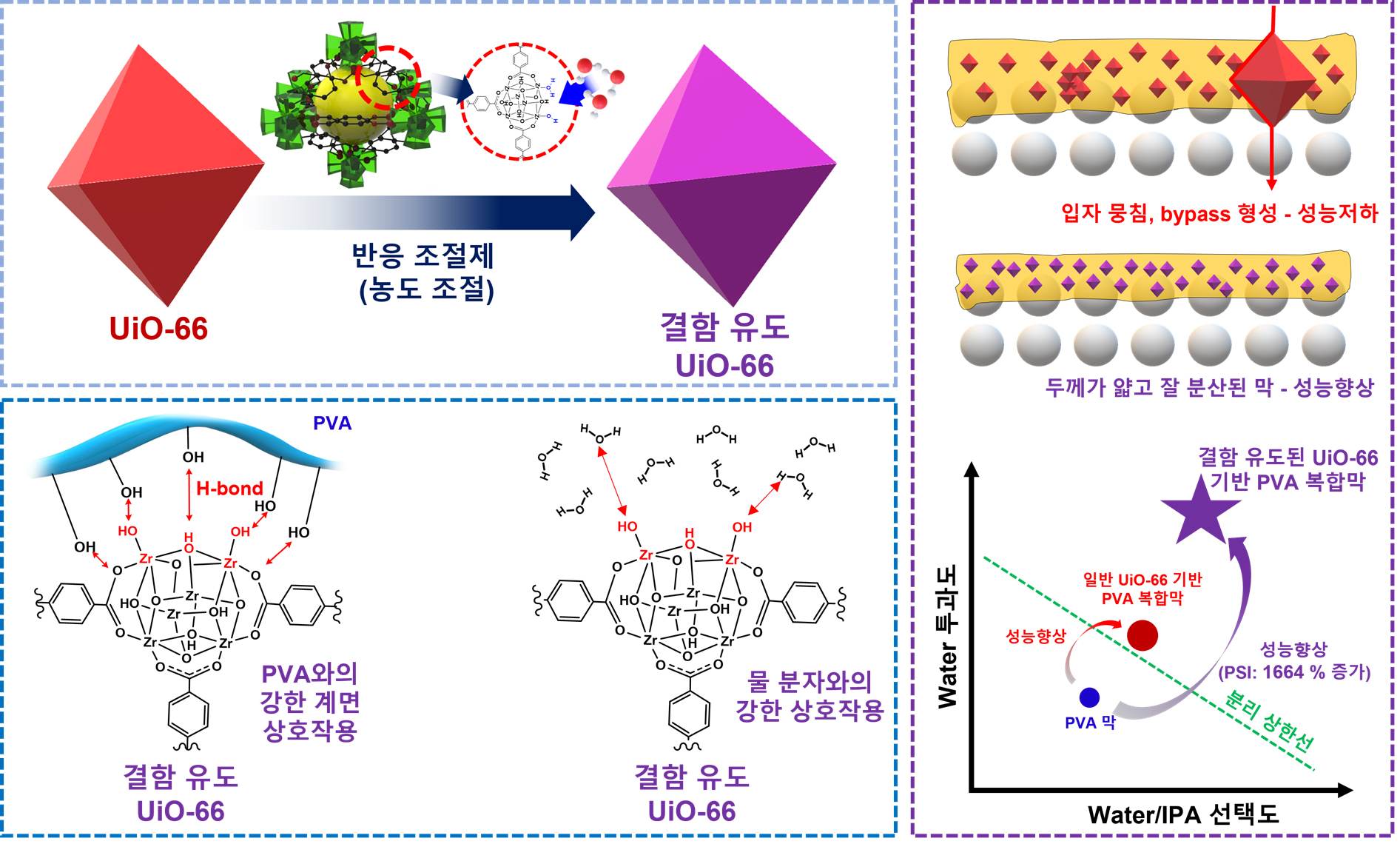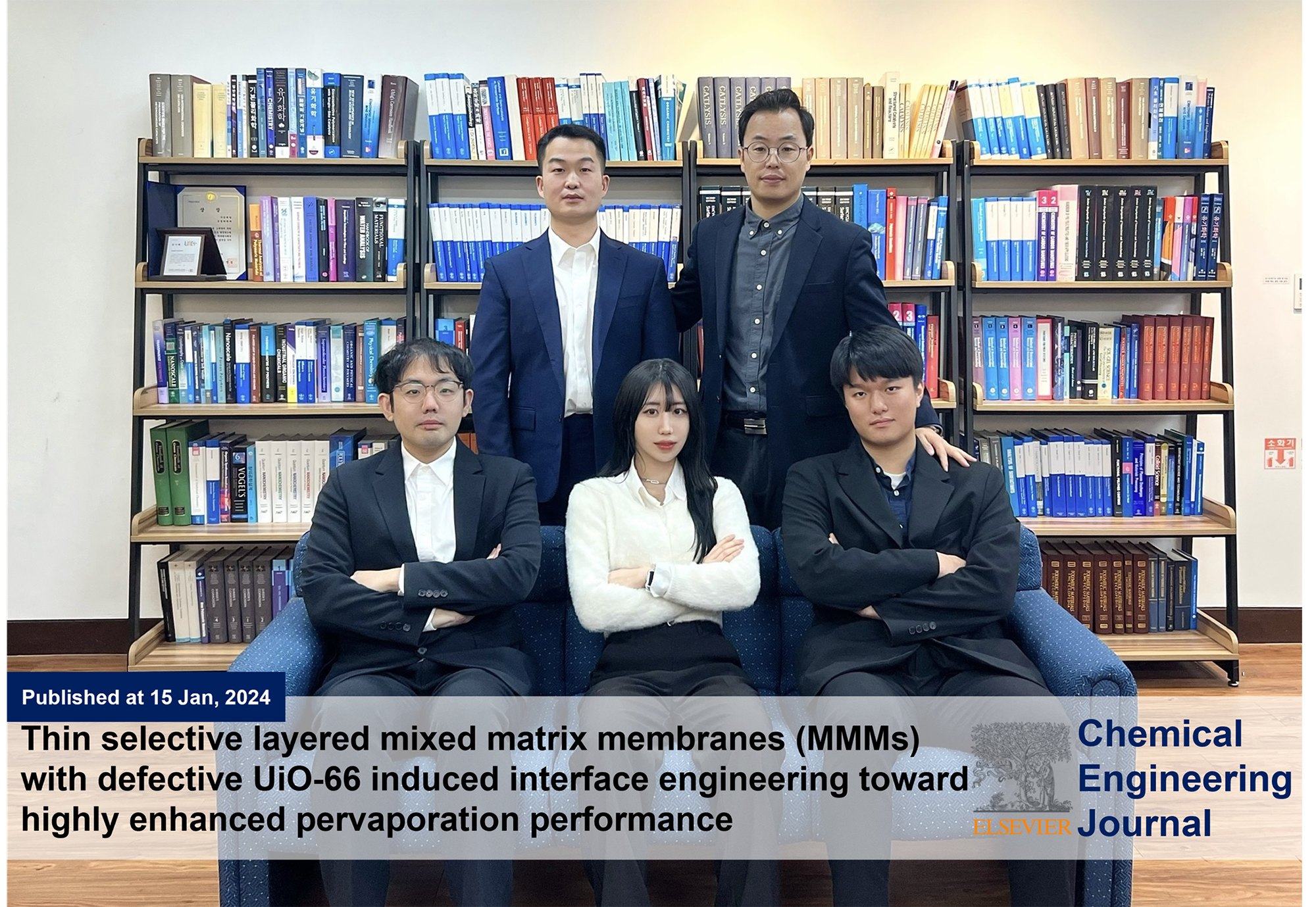연구/산학
PKNU Research 1000
| Cho Kie-Yong | Developed a high-performance composite membrane based on MOF | |||
| 작성자 | 대외협력과 | 작성일 | 2024-06-14 |
| 조회수 | 24303 | ||
| Cho Kie-Yong | Developed a high-performance composite membrane based on MOF | |||||
 |
대외협력과 |  |
2024-06-14 |  |
24303 |
Prof. Cho Kie-Yong's team at PKNU developed a high-performance composite membrane based on MOF
- the results of joint research with the Korea institute of energy research published in an international academic journal

△ The synthesis of defective MOFs and the impact of defects on the membrane and membrane performance.
The research team led by professor Cho Kie-Yong (industrial chemical) at Pukyong National University succeeded in developing a high-performance composite membrane by intentionally inducing defects in UiO-66 nanoparticles, one of the metal organic frameworks (MOFs), and analyzing the impact of these defects on the manufacturing and performance of the composite membrane.
Professor Cho Kie-Yong achieved results in this research through joint research with professor Kwon Hyuk-Taek chemical engineering), professor Son Min-Young and the research team led by doctor Yeo Jeong-Gu at the Korea institute of energy research.
Metal-organic framework materials are porous, crystalline particles made by synthesizing metals and organic materials, allowing for various combinations, and due to its unique characteristics, such as high specific surface area, uniform pore size, and high adjustability, research is currently being actively conducted to utilize it in various fields such as catalysts, gas separation, and storage.
However, because this material has low compatibility with polymer materials, it has the disadvantage of significantly reducing membrane stability and separation performance due to particle agglomeration. In addition, when manufacturing a thin composite film with this material, the shape stability was lowered depending on the separation driving conditions, so it was difficult to manufacture it in thin film form.
To overcome this limitation, the research team developed a synthesis method that intentionally induces defects in UiO-66 particles by controlling the concentration of reactants such as reaction modulators and developed reaction conditions favorable for high-capacity synthesis while controlling the interfacial properties of particles in an easy and simple way, and developed a composite membrane that shows stable driving performance even in thin film-type separators.
This defect induced in UiO-66 particles strengthened the interaction with the polymer, minimizing dispersibility problems, and increased the interaction with water, the separation target, significantly improving separation performance.
The thin-film composite membrane manufactured by the research team using strong interactions caused by defects showed significantly higher separation performance, with the pervaporation index (PSI) improved by approximately 1,664% (16 times) compared to existing polymer membranes.
Research member Choi Kyeong-Min, the first author of this research paper, said, "If defects in metal-organic framework materials can be intentionally adjusted or controlled, I expect that related industries will become larger and diverse by applying this material, which is used in various fields. We plan to conduct more active research on the development, utilization, and commercialization of new materials in the future."
This research was supported by the National research foundation of Korea with the young researcher program, and the research paper 'Thin selective layered mixed matrix membranes (MMMs) with defective UiO-66 induced interface engineering toward highly enhanced pervaporation performance' was published in <Chemical engineering journal>, an international academic journal in the field of chemical engineering (IF=15.1) on February 15th. <Pukyong Today>

△ The research team. (doctoral student Kwon Young-Je, master's student Bae Ji-Woo, and master's student Choi Kyeong-Min from the left in the front row, master's student Kaiyun Zhang and professor Cho Kie-Yong in the back row, from the left)